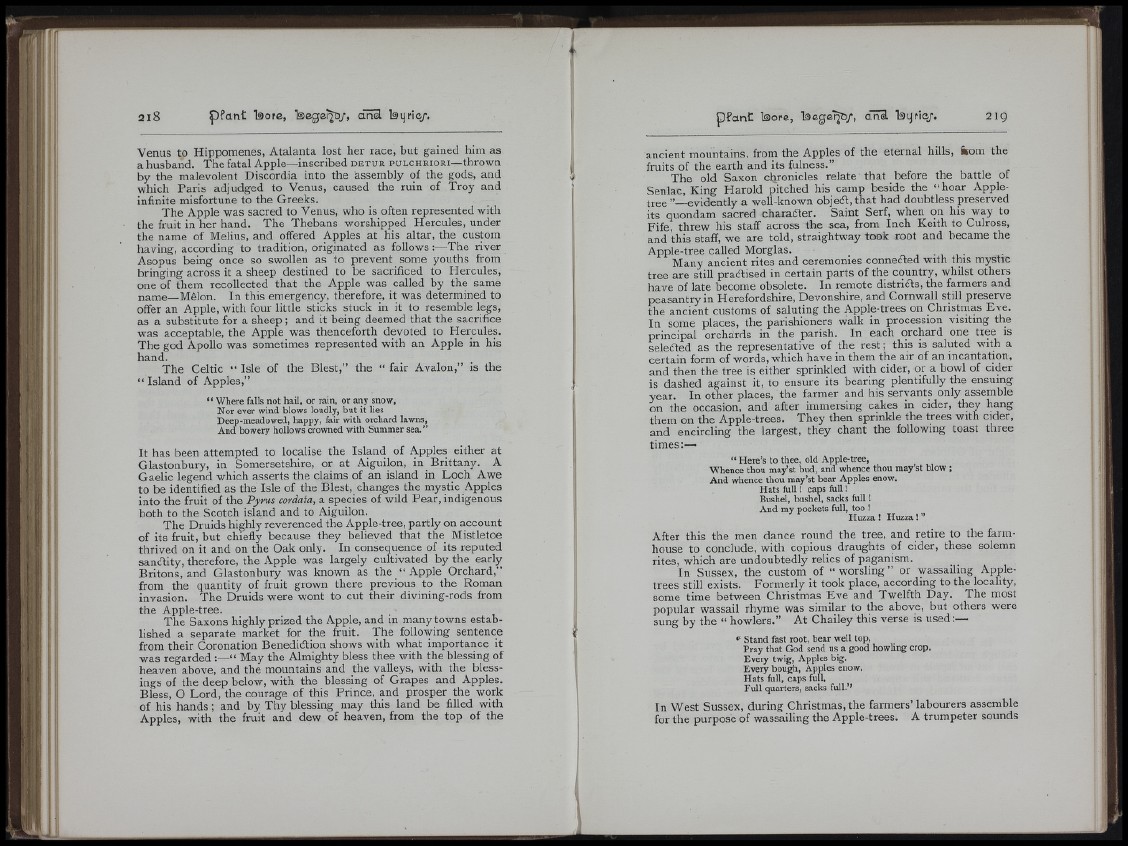
■■■
! -1 1
218 p F a n t "bore, Tseger^/, cmi. Isq n c /,
Venus to Hippomenes, Atalanta lost her race, but gained him as
a husband. The fatal Apple—inscribed d e t u r p u l c h r io r i— thrown
by the malevolent Discordia into the assembly of the gods, and
which Paris adjudged to Venus, caused the ruin of Troy and
infinite misfortune to the Greeks.
The Apple was sacred to Venus, who is often represented with
the fruit in her hand. The Thebans worshipped Hercules, under
the name of Melius, and offered Apples at his altar, the custom
having, according to tradition, originated as follows:—The river
Asopus being once so swollen as to prevent some youths from
bringing across it a sheep destined to be sacrificed to Hercules,
one of them recollected that the Apple was called by the same
name—Melon. In this emergency, therefore, it was determined to
offer an Apple, with four little sticks stuck in it to resemble legs,
as a substitute for a sheep ; and it being deemed that the sacrifice
was acceptable, the Apple was thenceforth devoted to Hercules.
The god Apollo was sometimes represented with an Apple in his
hand.T
he Celtic “ Isle of the Blest,” the “ fair Avalon,” is the
“ Island of Apples,”
“ Where falls not hail, or rain, or any snow,
Nor ever wind blows loudly, but it lies
Deep-meadowed, happy, fair with orchard lawns,
And bowery hollows crowned with Summer sea.”
It has been attempted to localise the Island of Apples either at
Glastonbury, in Somersetshire, or at Aiguilon, in Brittany. A
Gaelic legend which asserts the claims of an island in Loch Awe
to be identified as the Isle of the Blest, changes the mystic Apples
into the fruit of the Pyrus cordata, a species of wild Pear, indigenous
both to the Scotch island and to Aiguilon.
The Druids highly reverenced the Apple-tree, partly on account
of its fruit, but chiefly because they believed that the Mistletoe
thrived on it and on the Oak only. In consequence of its reputed
sanaity, therefore, the Apple was largely cultivated by the early
Britons, and Glastonbury was known as the “ Apple Orchard,”
from the quantity of fruit grown there previous to the Roman
invasion. The Druids were wont to cut their divining-rods from
the Apple-tree.
The Saxons highly prized the Apple, and in many towns established
a separate market for the fruit. The following sentence
from their Coronation Benediaion shows with what importance it
was regarded “ May the Almighty bless thee with the blessing of
heaven above, and the mountains and the valleys, with the blessings
of the deep below, with the blessing of Grapes and Apples.
Bless, O Lord, the courage of this Prince, and prosper the work
of his hands; and by Thy blessing may this land be filled with
Apples, with the fruit and dew of heaven, from the top of the
p F a n t "bore, b e g e q b /, orii. b q n e /, 219
ancient mountains, from the Apples of the eternal hills, fcom the
fruits of the earth and its fulness.”
The old Saxon chronicles relate that before the battle of
Senlac, King Harold pitched his camp beside the “ hoar Apple-
tre e ’’—evidently a well-known objea,that had doubtless preserved
its quondam sacred charadter. Saint Serf, when on his way to
Fife, threw his staff across the sea, from Inch Keith to Culross,
and this staff, we are told, straightway took root and became the
Apple-tree called Morglas. , ■ 1 u-
Many ancient rites and ceremonies connected with this mystic
tree are still pra^ised in certain parts of the country, whilst others
have of late become obsolete. In remote distri^s, the farmers and
peasantry in Herefordshire, Devonshire, and Gornwall still preserve
the ancient customs of saluting the Apple-trees on Christinas Eve.
In some places, the parishioners walk in procession visiting the
principal orchards in the parish. In each orchard one tyee is
seledted as the representative of the rest; this is saluted with a
certain form of words, which have in them the air of an incantation,
and then the tree is either sprinkled with cider, or a bowl of cider
is dashed against it, to ensure its bearing plentifully the ensuing
year. In other places, the farmer and his servants only assemble
on the occasion, and after immersing cakes in cider, they hang
them on the Apple-trees. They then sprinkle the trees with cider,
and encircling the largest, they chant the following toast three
times:—
“ Here’s to thee, old Apple-tree,
Whence thou may’st bud, and whence thou may’st blow ;
And whence thou may’st bear Apples enow.
Hats full 1 caps full!
Bushel, bushel, sacks fu ll!
And my pockets full, too !
Huzza ! Huzza ! ”
After this the men dance round the tree, and retire to the farmhouse
to conclude, with copious draughts of cider, these solemn
rites, which are undoubtedly relics of paganism.
In Sussex, the custom of “ worsting ” or wassailing Apple-
trees still exists. Formerly it took place, according to the locality,
some time between Christmas E v e and Twelfth Day. The most
popular wassail rhyme was similar to the above, but others were
sung by the “ howlers.” At Chailey this verse is used:—
“ Stand fast root, bear well top,
Pray that God send us a good howling crop.
Every twig. Apples big.
Every bough. Apples enow.
Hats full, caps full.
Full quarters, sacks full.’’
In West Sussex, during Christmas, the farmers’ labourers assemble
for the purpose of wassailing the Apple-trees. A trumpeter sounds